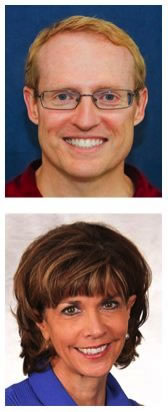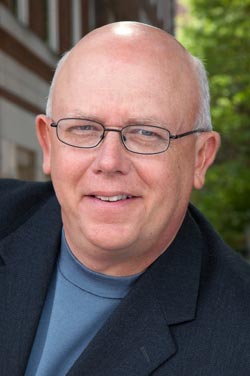 |
|||||||||||||||||
"I see my role as teaching students to think critically and historically about both world events and their own lives. I prepare them to be critical thinkers and engaged citizens in all contexts that they might encounter, whatever their pursuits."
|
 |
Teaching large classes can pose particular challenges. How do you personalize interaction in a class with more than 100—or even more than 200—students? How do you promote student engagement when it’s so easy for a student to hide in the crowd? How do you provide helpful feedback without burying yourself with grading?
This Conversation on Teaching will provide a forum for Vanderbilt instructors to share some of the strategies they have developed or adapted from the literature to deal with the challenges of large classes. Three faculty panelists will kick-start the conversation by describing some of their successful strategies and ongoing challenges:
- Carl Johnson
Stevenson Professor, Biological Sciences - Sandra Rosenthal
Jack and Pamela Egan Chair, Chemistry - Andrew Van Schaack
Assistant Professor of the Practice, Department of Human and Organizational Development
More offerings for
|
Cynthia Brame recently talked to our panelists about key strategies they have developed for teaching large classes successfully, as well as to Terry Page, an experienced teacher of large classes, Professor of Biological Sciences, and winner of the 2011 Madison Sarratt Prize for Excellence in Undergraduate Teaching. Their conversations focused in part on three major themes.
Promoting student engagement
Unsurprisingly, all four faculty members emphasized the importance of promoting student engagement in class, although they use different mechanisms to do so. Terry Page and Carl Johnson noted that students’ motivation is key for learning, and that it’s vital to convey how the material is relevant to students’ interests in order to maintain that motivation. Both talked about using well-known diseases to illustrate basic biological principles in large majors’ courses that are heavily populated by premedical students, and Carl said that he talks about sex at every opportunity in non-majors’ human biology courses—because what college student is not interested in sex?
Sandy Rosenthal helps maintain student interest by setting up class so that students’ have opportunities to talk—and have clear cues about when they can do so. Before class begins, she plays music, both to help her focus (a vestige of her days as a basketball player) and to give students time to talk. When the music stops, it serves as a signal to students that it’s time to focus on class. During class, Sandy gives students time to talk at regular intervals, such as while answering “clicker” questions, watching demonstrations, or during periods when she needs a prolonged period to write on the board.
Andy Van Schaack typically focuses his class around questions, and he ensures students are prepared for these discussions by giving 15 reading quizzes over the course of the semester. For each reading assignment, he gives the students four questions. At the beginning of class on a reading quiz day, he puts up the four questions, then chooses one on the spot to serve as the question for the 10-minute quiz. He says that this strategy not only helps ensure that students are prepared for rich class discussions but also that they arrive at class on time and ready-to-work.
The benefits
Although they recognized the challenges of teaching large classes, Carl Johnson and Terry Page were especially eloquent in describing the payoffs of these classes. “The energy of the large group sucks you in, energizes you,” said Terry. “The students are really energetic and want to learn,” added Carl, suggesting that the students’ energy and desire to learn closes the loop by motivating him to be a more engaged and energetic teacher.
Read Cynthia Brame's entire article.
![]()
Teaching to Thousands: A Conversation about Massive Open Online Courses (MOOCs)
 |
Last September, Vanderbilt announced a partnership with Coursera, an online platform for open-access, non-credit classes, available at no cost to participants. Such courses have been dubbed “MOOCs,” or massive open online courses, and Vanderbilt faculty will offer five such courses via Coursera this spring.
 What is it like to design and teach an online course for tens of thousands of students around the world? Join us for a conversation with two faculty members teaching Coursera courses this spring: computer science professor Douglas Schmidt, whose course on pattern-oriented software architectures launches March 4th, and nutrition instructor Jamie Pope, whose nutrition course starts in April. You’ll hear from our panelists about the tasks and mindsets involved in teaching a MOOC, and participate in a discussion of how these kinds of courses might fit into the teaching and learning landscape here at Vanderbilt.
What is it like to design and teach an online course for tens of thousands of students around the world? Join us for a conversation with two faculty members teaching Coursera courses this spring: computer science professor Douglas Schmidt, whose course on pattern-oriented software architectures launches March 4th, and nutrition instructor Jamie Pope, whose nutrition course starts in April. You’ll hear from our panelists about the tasks and mindsets involved in teaching a MOOC, and participate in a discussion of how these kinds of courses might fit into the teaching and learning landscape here at Vanderbilt.
Thursday, February 21, 3:10-4:30pm
Location: Community Room, on the ground floor of the Central Library
Register for this event
![]()
GradSTEP Provides Professional Development for Graduate and Professional Students
 |
On January 26th, the CFT celebrated its 15th annual Graduate Student Teaching Event for Professional Development (gradSTEP). This year’s event, co-sponsored by the Graduate Student Council, focused on the theme, “Beyond Four Walls: Transcending the Classroom.” The day’s events dealt extensively with how participants could utilize an array of pedagogies and techniques to enrich the student experience, both inside the classroom and out. Ninety-seven graduate students and post-doctoral fellows from 38 departments within six Vanderbilt Schools (Arts & Science, School of Medicine, Peabody, Divinity, School of Engineering, and School of Nursing) attended the event.
GradSTEP 2013 kicked off with a plenary panel, entitled “Networks of Learning: Online, in the Community, and in Students’ Lives.” The plenary sought to engage the changing nature of the college classroom, in particular, the challenges and opportunities associated with online learning, service learning, and bringing students’ lives into the classroom experience. The plenary featured presentations by Dr. Nancy Chick (Center for Teaching/English), Dr. Sharon Shields (Human & Organizational Development), and Dr. Barbara Stengel (Teaching and Learning). The event was moderated by Graduate Teaching Fellow Katie Headrick Taylor, a PhD candidate in Peabody College’s Teaching and Learning program.
After some introductory comments by Ms. Taylor, Dr. Nancy Chick, Assistant Director of the Center for Teaching, started off the panel with a brief presentation on her experiences as an online educator. Dr. Chick provided tips and strategies for teaching online effectively, while targeting her presentation not only at those participants hoping to teach their own online courses, but also to those participants looking to enrich their traditional face-to-face classes through the integration of online tools and techniques. Ultimately, Dr. Chick concluded, many of the best and most effective learning environments are blended, in which online activities are not merely supplemental, but engrained into the classroom experience. Read the entire GradSTEP recap.
If you were not able to attend this year's event, materials and resources from all GradSTEP sessions are now available on the GradSTEP web page.
![]()
Grad Students, Come Work at the CFT!
 |
The Center for Teaching is now accepting applications for its 2013-14 Graduate Teaching Fellow and Teaching Affiliate positions.
- Graduate Teaching Fellows (GTFs) are employed for the entire academic year, engage in a variety of CFT activities around training and supporting Teaching Assistants across the university, and are paid $20,000 August - May.
- Teaching Affiliates prepare and lead sessions at our annual Teaching Assistant Orientation in August, working about 70 hours total (mostly in August), and are paid $1000.
These positions are great opportunities for graduate students to refine their teaching and presentation skills, network with graduate students outside of their department or program, and develop expertise in training and supporting new TAs. Every year, our Teaching Affiliates and GTFs tell us how much they enjoyed and benefited from their experience working at the CFT.
Additional information and application instructions can be found here.
Applications are due Friday, March 1st.
![]()
From the Stacks...
 |
Classroom assessment techniques: a handbook for college teachers
by Thomas A. Angelo, Kathryn Patricia Cross
This revised and greatly expanded edition of their 1988 handbook now includes a self-contained self-assessment device--the Teaching Goals Inventory--for identifying and clarifying instructional goals. And the book offers teachers at all levels of experience detailed, how-to advice on Classroom Assessment--from what it is and how it works to how to plan, implement, and analyze assessment projects.
The book features fifty valuable Classroom Assessment Techniques, each presented in a format that provides an estimate of the ease of use, a concise description, step-by-step procedures for adapting and administering the technique, practical advice on how to analyze the data, pros, cons, caveats, and other useful information. These fifty Classroom Assessment Techniques are cross-indexed so that teachers can easily locate the appropriate techniques for assessing their particular teaching goals in their academic disciplines. Techniques are also indexed for their usefulness in assessing content knowledge, higher-order thinking skills, course-related attitudes and values, and students' reactions to the course.
Available in the Center for Teaching library.
 For many years, The Center for Teaching has hosted Teaching Visits, among the most productive and helpful events we offer. They are wonderful opportunities for Vanderbilt teachers to observe directly and then discuss various forms of teaching across the disciplines, building collegiality and expertise around inquiries into teaching and learning.
For many years, The Center for Teaching has hosted Teaching Visits, among the most productive and helpful events we offer. They are wonderful opportunities for Vanderbilt teachers to observe directly and then discuss various forms of teaching across the disciplines, building collegiality and expertise around inquiries into teaching and learning.



